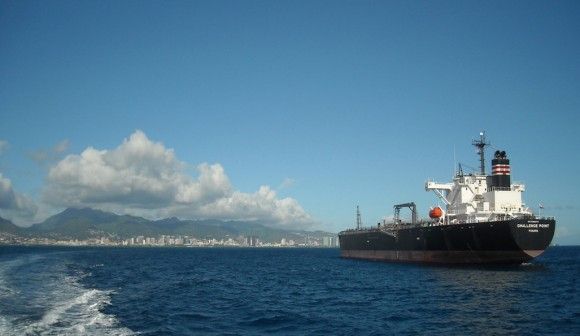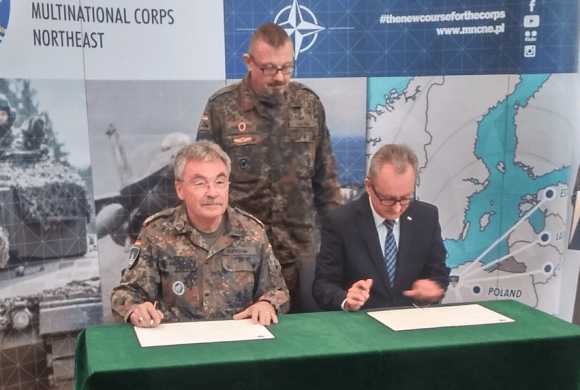- WIADOMOŚCI
Space Plans Made By The Polish Ministry of Defence. “Defined Needs” vs. Great Challenges
Among the departments of the Polish government, it is the Ministry of Defence that is in possession of the best-defined set of needs, within the domain of developing the space programmes. However, numerous challenges have been created, within the scope of meeting the assumed objectives, including acquisition of a sovereign optoelectronic system. Creation of a national space strategy may be a step which could make those plans feasible.
Among the Polish government departments, it is the Ministry of Defence that is in possession of the best-defined set of needs, within the domain of developing the space programmes. This was noted, inter alia, by professor Marek Banaszkiewicz, working as the president of POLSA (Polish Space Agency), during the 2016 Space Sector Forum, organized at the Copernicus Science Center. “I am referring myself to the fact that if we are willing to make steps towards development of the sector, innovation is important, industrial development is important, but it is the state that makes financial contributions both to the ESA, as well as to the national programme, and it is the state that is required to define the ultimate goals of such initiatives.It is, obviously, the Polish Ministry of Defence that offers the most specific proposals.These proposals include Earth Observation Satellites, SST initiative, which is to support the monitoring processes related to the objects moving around the Earth, in the outer space, and finally, small launch vehicles”.
Optronic and SAR Satellites
As the spokesman for the Polish Ministry of Defence informed, the main areas of interest for the Ministry include the Earth Observation satellite platforms, as well as space monitoring and satellite navigation and communications programmes. At the moment, the works are in progress, the aim of which is to provide the Polish Army with relevant capabilities within that scope. As Bartłomiej Misiewicz, Spokesman for the Polish Ministry of Defence, tells us:
From the point of view of the Ministry of Defence, the prioritized, prospective, and currently developed space programmes, may include the following:
a. National “Satellite optoelectronic Earth observation system”,
b. SST KE programme,
c. GALILEO programme.
According to the earlier announcements made by the Polish Ministry of Defence, the Ministry is currently focused on achieving capabilities of obtaining satellite reconnaissance imagery.
Obtaining the capabilities of acquiring satellite imagery, within the scope of the reconnaissance operations, constitutes one of the operational requirements priorities for the Polish Armed Forces. The aforementioned requirements were defined during the operational needs review back in 2012, and within the scope of a top priority operational programme, the aim of which is to be in possession of capabilities of carrying out imagery intelligence operations (the above also concerns acquisition of UAV systems for the Polish military).
Optoelectronic satellite or several satellites of this type acting as a single system, are going to become the main tool which is going to make it possible to obtain the aforementioned capabilities. Such solution would allow Poland to acquire, on its own, data within that domain, without any needs to use external providers of similar services. The tender pertaining creation of a reconnaissance satellite(s) is going to be initiated next year, it is possible that the procedure would be realized in a form of a national strategic programme. Value of the programme is estimated as PLN 700 million. It is expected that the Polish industry will make a significant contribution to the process in which the satellite is going to be constructed, which, in turn, should have an accelerating impact on the progress of the whole programme.
At the same time, Poland is also carrying out a number of research initiatives, pertaining the options of constructing a SAR satellite, fitted with a synthetic aperture radar. The initial feasibility study pertaining the above-mentioned system has been ordered by POLSA at the end of last year. Consortium led by Airbus Defence and Space PZL “Warszawa-Okęcie” S.A. branch is going to act as the contractor, within the framework of the aforementioned order. At the moment, within the scope specified above, the Polish Army uses the COSMO SkyMed Seconda Generazione system. Nonetheless, establishing own, independent capabilities in that area may contribute to increased Polish sovereignty, within the domain of collecting satellite radar data.
P-DUGS (Polish – Defence User Ground Segment) station construction works are also quite a significant element of the agreement signed with the Italians. The facility is expected to be erected in Bialobrzegi, north of Warsaw, and it is also expected that the base will reach its initial operational readiness next year, while full operational capability status is planned to be achieved by 2020. The infrastructure in question will make it possible to delegate the tasks to the Cosmo-SkyMed satellites, and receive data from them quicker. The station will also be important when it comes to the optoelectronic data received within the framework of the Polish-Italian bilateral military collaboration in the field of security and defence. In the future, after the system is expanded, the base will also be used to receive the data provided by the Polish reconnaissance satellites.
READ MORE: Optoelectronic Data For Poland: Polish Satellite And Expansion of the Agreement with Italy
Other Priority Areas
Also within some other areas, defined as those that have a high development priority, well-defined, specific works have been already started. In March 2016, an initial feasibility study was ordered, covering the area of possibilities and conditions for realization of the works related to Space Domain Awareness (SDA) / Space Situational Awareness (SSA) systems, with a particular emphasis placed on the subsystem for Space Surveillance and Tracking (SST), with the latter suite being created to fulfil the needs of the armed forces, security services, administrative crisis management and the Polish economy. Creation of such a tool would let Poland track spy satellites that orbit over the territory of the country, which is very significant for the security of the Polish defence potential.
READ MORE: POLSA Works On A Space Domain Awareness System
Moreover, space technology collaboration is also under-way, involving the European Space Agency, European Defence Agency and the European Commission, in line with the adopted priority research directions at the Ministry of Defence, within the scope of the innovative defence technologies. It is the European Space Agency that manages the European Galileo navigation programme. Spokesperson for the Polish Ministry of Defence defined this programme as one of the Polish priorities, when it comes to the space initiatives.
Polish Ministry of Defence also states that scattering of the Polish companies constitutes a threat for the process in which military space operational capabilities are built. Bartlomiej Misiewicz claims that the Ministry sees a great need to consolidate the Polish companies altogether, so that joint effort could be undertaken.
Polish Ministry of Defence and the National Space Strategy
Without any doubts, as it was admitted by several officials in their interviews for Space24, including General Adam Sowa, for the purposes of implementation and realization of ambitious goals within the programmes and areas listed by the Ministry of Defence, it would be required to create a Polish Space Strategy which could make it possible to define which programmes bear most of the significance and substance, and what ways shall be used to realize them, on the basis of the existing research potential and industrial capabilities. Such approach also could make it easier to consolidate the aforementioned potential, for the purpose of realizing the assumed goals.
Geopolitical situation Poland found itself in requires us to be in possession of a proper level of autonomy, within the scope of the satellite systems, operating in order to meet the defence and security needs of the state. This may be achieved solely on the basis of the domestic research-industrial potential, and this is achievable, within the scope of our capacity. Moreover, by getting out of the trap posed by an average tempo of economic growth, Poland shall fully use the innovative development potential of the Polish space sector. Thus, creating a national space strategy, taking into account potential military-civil synergies, bears an absolutely prioritized significance.
Moreover, it is worth noting that important role, within the process in which the space strategy is formed, is being played by the Polish Ministry of Defence, acting as one of the main financing entities, when it comes to emergence of the Polish space capabilities. The Ministry is also going to be the main user of the reconnaissance satellites, and of several other space-focused systems, such as the one which is going to provide the Polish military with space awareness.
At the moment, some steps are being taken towards creation of the Polish space strategy. The starting point is seen in the “Polish Space Sector Development Plan”. Inspectorate for Implementation of Innovative Defence Technologies (I3TO) is the main unit coordinating the works within that area. Polish Space Agency, which has been established back in 2014, is carrying out the non-military activities within that scope.
Summary: Space Capabilities – A Must Have for the Polish Armed Forces
Polish Ministry of Defence has set out ambitious goals within that area, the implementation and realization of which may lead to a situation in which Poland obtains new, key capabilities, within the area of defence and security. Space technologies, such as satellite reconnaissance, navigation and communications, are currently an indispensable element of the inventory deployed by the contemporary armed forces. These areas are being developed by all of the reputable armies globally. Thus, it is not a surprise that Poland, constructing its own defence and deterrence potential, is forced to get interested in space programmes, without which many modern programmes have no justification, or the capabilities of which, with exclusion of the space component, are significantly reduced. Cruise missiles or long range artillery systems both constitute a good example of the above problem.
At the same time, plans made by the Ministry of Defence make it possible to create the Polish National Space Strategy, and to develop the Polish space sector. The initiatives undertaken by the Polish MoD may push the whole space sector forward. The industry, in order to meet the requirements formed by the Ministry, would be forced to consolidate its efforts, maybe also on the basis of the national space programme.


















